James R. Callan's Blog, page 16
June 10, 2016
An Interview with Juan Grande
Interview with Juan Grande
Jim: Today, I’m interviewing Juan Grande. He lives in Puerto Vallarta, Mexico, and as I understand it, he was a big help to Crystal Moore in A Silver Medallion. How are you today, Mr. Grande?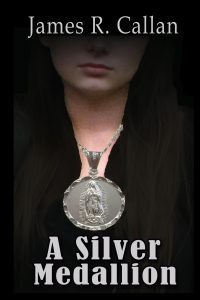
Juan: I am fine, gracias. I not know where “Grande” come from. Please call me Juan.
Jim: Okay, Juan. Of course, Juan Grande translates to Big John. You must admit, you are a stout person.
Juan: Please forgive my English. I not know “stout.” My wife call me solid.
Jim: Okay. That works for me. How did you get to know Crystal?
Juan: My amigo Bull O’Malley call me . Ask I look after her. Help her if possible.
Jim: Did he tell you what help she might need?
Juan: He say she want rescue two niñas, ah, girls, from bad man in San Sebastian.
Jim: Just how bad was this man in San Sebastian?
Juan: Muy bad. Kill people. Steal. Lie. I think drugs.
Jim: Kills people? Who is this man? What is his name?
Juan: He is called Josè Rodriquez de Allende.
Jim: Can’t the police arrest him, lock him up?
Juan: He is rich, powerful. Many men work for him. Maybe police also. He own police. We no get help from police.
Jim: That’s sounds like a big order. How did you go about it? And were you successful?
Juan: I no can tell you. Author tell me no give away plot.
Jim: It sounds dangerous. Did Crystal work with you? Did she help any, or did she just come down and ask you and your men to do it?
Juan: I ask her stay in Puerto Vallarta. Me and my men rescue girls. But she say no. She must help. She no can ask me do it and not help. I beg her stay in Puerto Vallarta. But she no let us go and not she go.
Jim: Did she actually do anything to help?
Juan: Si. Yes. She muy importante. She take girls away.
Jim: Took them away? How did she do that?
Juan: I no can tell you. Author tell me no give away plot.
Jim: Juan, your English is pretty good. Where did you learn it?
Juan: Mi esposa, ah, wife, take university in Texas. She speak good English. I learn some.
Jim: How do you know Mark?
Juan: Bull have home in Vallarta. I meet him long time back. He ride the bulls. He ride one time here. We have much memories.
Jim: Juan, it has been a pleasure talking with you. And I’m anxious to find out if you got the young girls free, and how you – and Crystal – accomplished it if you did. Thank you for your time, and stay safe from Josè Rodriquez de Allende.
Readers, as I understand it, Juan Grande was instrumental in the rescue of the girls. And while he wouldn’t say if they succeeded of not, I believe they were successful. Otherwise, Juan Grande might not be here today. But, I’m getting on the Internet right now to get a copy of A Silver Medallion. Would you like to join me?
Kindle: http://amzn.to/1WxoEaF
90 secondTrailer: https://animoto.com/play/key7NqR0qbmN...#
June 3, 2016
What Happens When You Can’t Do What You Do?
Today’s guest is Kate Preston, coming to us from Montreal, Canada. She published her debut novel, A Vintage Year last fall. I read the book, and so enjoyed it that i ask Kate if she would do a guest blog for The Author’s Blog. She agreed, and here it is.
She published her debut novel, A Vintage Year last fall. I read the book, and so enjoyed it that i ask Kate if she would do a guest blog for The Author’s Blog. She agreed, and here it is.
What happens to professional athletes after they retire?
Awhile ago I began thinking about what happens to professional athletes after retirement since so many of them retire in their 30s for physical reasons. Unless they become sports commentators , we never really hear about them again. I imagine it would be like the college football players only on steroids. All that success through their 20s, quite possibly the only thing they had lived and trained for until their retirement. When they’re playing whatever sport they were in, they’d be mobbed by their fans. Imagine going from that existence to almost anonymity the season following retirement.
To transition from being in the lime light, competing for trophies, receiving cheers from the crowd, having fans wanting their autograph, photograph, or just a piece of them, to becoming an unknown must be pretty difficult at first, even for the most emotionally mature. Their ego must take a beating….
Thinking about all these factors, I stared developing a character. He would be a tennis player because I play it and follow the sport, and he would have been groomed for tennis from an early age. He would have an overbearing parent. And, because he had an entourage looking after him and his needs for most of his life, he would be emotionally immature, leading to fits of temper, self-centredness, and a lack of empathy. I know, he sounds like a charmer, but that’s the thing — he is quite the charmer, used to getting his own way with a wink and a smile. Maybe the naïve side of him didn’t quite accept that part of his charm lay with his fame and fat wallet, but as long as he was paying, he had a wide network of friends. Of course, he had to be empathetic deep down or the reader (or writer, for that matter) would never be able to bond with him.
 I decided to start the story eight years after his retirement from tennis was because I wanted to see what he would do when he was at his own personal financial tipping point. The question was, would he be able to turn his life around or was he so spoiled and self-centered that he would dig himself into a deeper and deeper hole? I thought the best way test him was to give him a job that he would find unpleasant and unthinkable.
I decided to start the story eight years after his retirement from tennis was because I wanted to see what he would do when he was at his own personal financial tipping point. The question was, would he be able to turn his life around or was he so spoiled and self-centered that he would dig himself into a deeper and deeper hole? I thought the best way test him was to give him a job that he would find unpleasant and unthinkable.
So, what could be worse for a man who has regular manicures and lives at five-star hotels than being, say, a farm hand? Tasks include cleaning out animal stalls, tending grape vines, and taking orders from others, all while having to keep his mouth shut. Oh, I could feel for him, yes I could. I understood his resentment, his disbelief that he was in that situation at all. Every time I pick up a toilet brush, or mop the kitchen floor, the princess inside me screams “I’m too good for this!”
I like to hope that in real life most athletes eventually adjust to normal life after retirement, and I’m sure some even revel in it, but I decided to explore what happens to one who refuses to accept defeat and realize that the glory days are over.
JIM: Visit Kate at: http:www.kateprestonbooks.com for updates or follow her on Twitter @kprestonbooks. Her book, A vintage Year is available on Amazon, Barnes and Nobel, and through other e-retailers. I can recommend it.
Now, what are your thoughts on professional athletes after retirement? We’d love to hear. And so would the other readers. Thanks.
May 27, 2016
THE BEST ADVICE EVER RECEIVED
Today’s guest is Renee-Ann, the author of Stella’s Plea (November  2012), which shortlisted in the Word Alive Press publishing contest (2011), and recently released her second novel, Emma’s Prayer. She’s now working on her third, Charlie’s Plight. She and her husband live on the Canadian Atlantic Coast. Her favorite quote: comes from Benjamin Disraeli: “The best way to become acquainted with a subject is to write about it.” Here is ReneeAnn’s take on ―
2012), which shortlisted in the Word Alive Press publishing contest (2011), and recently released her second novel, Emma’s Prayer. She’s now working on her third, Charlie’s Plight. She and her husband live on the Canadian Atlantic Coast. Her favorite quote: comes from Benjamin Disraeli: “The best way to become acquainted with a subject is to write about it.” Here is ReneeAnn’s take on ―
I’ve always loved writing stories, but it remained a hobby for a great many years. I also enjoy a good challenge so when I first attempted to write a novel, I decided to try my hand at a court drama. Ouch! It wasn’t at all what I’d expected. Little did I know how hard it would be. Don’t get me wrong, I had a lot of fun trying, I usually do when I make up stories, but although I had what I thought was a great beginning and end, I had absolutely no idea how to tackle the middle, the court case itself. Reading courtroom dramas is one thing, writing them is another. What was I to do?
People advised me to watch TV shows like CSI and the likes. I don’t watch much TV and couldn’t get into any of those, so I began with what I felt was the obvious: Reading. After all, writers read too. I began to familiarize myself with real court cases, did some research on the internet, and sought the help of lawyers, but didn’t get anywhere. After much frustration, I decided to set it aside. It was either that, or give up entirely, and I wasn’t willing to do that. I did, however, follow the advice a bestselling author gave me. He said, and I quote:
“I urge you to finish that story and start another. This emotional separation will give you two great assets. First, you gain an emotional distance from your work. Second, you learn through doing that your profession and your current work are not one and the same.”
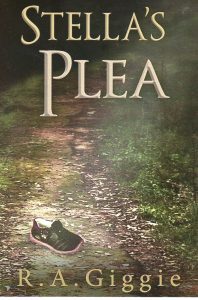 Try as I may, I couldn’t finish it, because I didn’t know how to develop that middle, but I did start a second novel. Once I’d finished it, and for months after that, I edited, did a lot of rewrites, and edited some more – yes, with the help of a professional editor – until she said, “it’s ready.” That’s when I self-published Stella’s Plea. Then I returned to the court drama, and tackled it again. I tweaked it to make it easier to write, and this past February, Emma’s Prayer became my second self-published novel.
Try as I may, I couldn’t finish it, because I didn’t know how to develop that middle, but I did start a second novel. Once I’d finished it, and for months after that, I edited, did a lot of rewrites, and edited some more – yes, with the help of a professional editor – until she said, “it’s ready.” That’s when I self-published Stella’s Plea. Then I returned to the court drama, and tackled it again. I tweaked it to make it easier to write, and this past February, Emma’s Prayer became my second self-published novel.
You see, I could have given up so easily, tossed it aside and never look back. The problem is, taking that route wouldn’t have put my story out there. The same goes for you. You have the desire to write, and you have ideas, all you need is to dig deeper and find the words. One thing that helps is a change of scenery. Instead of sitting at your desk, or on the sofa, you might want go to a coffee shop, or the library. Different sounds sometimes spark ideas on what to write next. It may even be a different room in the house. Personally, I have a desk in my ‘office’ but much prefer sitting in bed, laptop on my breakfast tray, and back pillow behind me. Whatever works best for you.
Another wonderful advice I received from that same bestselling author 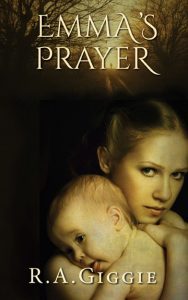 was to attend Christian Writers Conferences. For me, that’s become a must. I save frequent flyer points to cut cost otherwise I couldn’t afford to go, but it’s worth every penny I do spend. It’s knowledge gained that will never go to waste. It’s a place where you learn from those “who’ve been there done that,” meet awesome writers, and make wonderful friendships that will last a lifetime. There are many wonderful conferences out there, and chances are, there’s one not that far from you.
was to attend Christian Writers Conferences. For me, that’s become a must. I save frequent flyer points to cut cost otherwise I couldn’t afford to go, but it’s worth every penny I do spend. It’s knowledge gained that will never go to waste. It’s a place where you learn from those “who’ve been there done that,” meet awesome writers, and make wonderful friendships that will last a lifetime. There are many wonderful conferences out there, and chances are, there’s one not that far from you.
Now go on and get writing. Blessings.
Renee-Ann
Stella’s Plea: https://www.amazon.com/Stellas-Plea-R-Giggie-ebook/dp/B00ANURJJ2
Emma’s Prayer : https://www.amazon.ca/Emmas-Prayer-R-Giggie-ebook/dp/B01BVXDN2Q
Sign up for her blog at http://reneeanngiggie.com You can also follow her on: http://www.facebook.com/ragiggie
http://twitter.com/StellasPlea
May 20, 2016
The Secret of Great Writing
A special treat today. We have a post from Caleb Pirtle III. He’s been  in the publishing arena for 40 years. He’s worked at pretty much every level. He’s made a name for himself at each of those levels. He’s had sixty-five books published, three scripts made into TV shows, and countless shorter pieces. So when he speaks, it’s a good idea to listen. So, here he is giving us the secret of great writing. Caleb —
in the publishing arena for 40 years. He’s worked at pretty much every level. He’s made a name for himself at each of those levels. He’s had sixty-five books published, three scripts made into TV shows, and countless shorter pieces. So when he speaks, it’s a good idea to listen. So, here he is giving us the secret of great writing. Caleb —
I have lived in cities.
I have fought the traffic.
I have battled the crowds.
Didn’t like it.
Don’t want to go back.
Personally, I prefer Small Town America.
Little towns are distinctive.
The ones I like are off the beaten path.
They are self-sufficient or should be.
And an odd assortment of people walk their streets.
Dark.
Or sunny.
Out of sight.
Or in plain daylight.
It doesn’t matter.
Each of them has a story to tell.
They may not want it told until they die.
It may be the reason why they die.
Small towns think they have their secrets, but almost everyone knows what the secrets are. By mid-morning, everybody knows who did what to whom and why – and how much money or sex was involved.
Small towns are partly fact and partly fiction, and somewhere through the years, the lines began to blur.
That’s why so many great novels have been written in or about small towns.
They are full of love.
And love lost.
They are full of hate.
And sardonic smiles.
They are smitten by greed.
And jealousy.
Ambition.
And revenge.
We know them even if we have never met them.
They are our neighbors.
They are us.
No one ever captured the spirit and soul of Small Town America as well as Sherwood Anderson in his Winesburg, Ohio, a collection of short stories featuring an array of of people who, by fate or fortune, both good and bad, have chosen reside in the small Midwestern village. When cleverly woven together, their lives become the stuff of an unforgettable novel.
In his books and short stories, Anderson never emphasized plot or action.
Instead, according to one critic, he used “a simple, precise, unsentimental style to reveal the frustration, loneliness, and longing in the lives of his characters.”
His voice was unmistakable, and his writing greatly influenced and served as a guidepost for the works of William Faulkner, Ernest Hemingway, John Steinbeck, and Thomas Wolfe.
Anderson knew that all good novels were tied together with a little fact and a little fiction. Only imagination knew the difference.
Fact sounded like fiction.
Fiction becomes fact.
Imagination made them both real and believable.
The reader never knew which was which, nor did the reader care.
Anderson once wrote: “The life of reality is confused, disorderly, almost always without apparent purpose where in the artist’s imaginative life there is purpose. There is determination to give the tale, the song, the painting, form – to make it true and real to the theme, not to life …
“I myself remember – with what a shock – I heard people say that one of my own books, Winesburg, Ohio, was an exact picture of Ohio village life.” Nothing could have been farther from the truth.
As Anderson wrote: “The book was written in a crowded tenement district of Chicago. The hint for almost every character was taken from my fellow lodgers in a large rooming house, many of whom had never lived in a village.
“The confusion arises out of the fact that others beside practicing artists have imagination. But most people are afraid to trust their imaginations, and the artist is not.”
That, when it’s all said and done, may be the secret of great writing.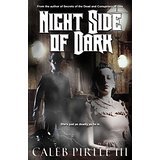
Find a little fact.
Let your mind spill out a little fiction.
Work them together.
Figure out a hook.
Then trust your imagination.
And let’s see where it leads you.
JIM: Please add your thoughts on the subject.
You can find more about Caleb at: http://venturegalleries.com/about/cal...
May 13, 2016
Writing is About More Than Just a Story
Today’s guest blogger is Karin Beery. She is an active member of American  Christian Fiction Writers, the American Christian Writers Association and Christian Proofreaders and Editors Network. She is represented by Steve Hutson of Word Wise Media.
Christian Fiction Writers, the American Christian Writers Association and Christian Proofreaders and Editors Network. She is represented by Steve Hutson of Word Wise Media.
Patience is a virtue, it’s just not mine.
If I had a nickel for every time I’ve said that, I could retire tomorrow on my own private island. It was fun to say – people laughed at my cleverness, but it also gave me a way to jokingly explain my impatience. For years it worked. Then I started writing.
I started my career with a novel. When I realized how little I knew about publishing, I started to explore other forms of writing while I revised my manuscript. I knew it needed a little work, but I had high hopes and expectations – a tweak here, an edit there, then I’d be ready to sign a contract. But life happens.
You end up taking a fulltime job, so your part-time writing job fills up your spare time, and the novel gets pushed aside. You quit your job to stay home and care for your aunt, but then your health declines, and for two years you can barely function. When you can function, your novel doesn’t even make the top half of your to-do list. One thing after another lands on your calendar, filling your days and novel-writing hours.
It doesn’t take long for depression to join you. You see your friends’ names appear on books and watch them win awards while you struggle to finish a chapter. Sometimes it doesn’t seem like you’ll finish anything.
But you keep writing.
And what you don’t notice is that while you’ve been struggling, you’ve been learning. And growing. And strengthening. And when you’re manuscript is finally cleaned up, you suddenly have an agent who enjoys working with you. And that’s when you realize it – you’ve become a writer.
Writing isn’t for the faint-hearted. You can’t be sensitive or emotionally attached. You need to see your work for what it really is – a product that you created. It’s not you, and how people respond to it isn’t a reflection of you. There are rules, guidelines, and techniques that need to be understood, mastered, and sometimes broken, but understanding that doesn’t come with writing one manuscript; it comes from years of hard work, studying, practicing, and writing.
When I started writing, I thought all I needed to do was write a good story. Yes, you do need a good story, but you need to become a writer too. You need to become someone who can take the criticism, put in the effort, and dedicate yourself to the cause of not just writing a story, but creating the best manuscript possible. For some, that happens quickly. For others, it takes time. For the dedicated, however, it doesn’t matter – keep learning, keep going, and keep writing.
JIM: Now’s the time to throw in your two-cents worth. Add your thoughts on the writing journey. Just click on the “Replies” button cleverly hidden below. Thanks.
You can also follow Karin on FaceBook at http://bit.ly/1ZetNlm
Find her on Twitter at https://twitter.com/karinbeery
Her website is www.karinbeery.com
May 6, 2016
Dreading the Inevitable or Expecting the Impossible
Today’s guest is Ginger Solomon, a mother of seven who manages to  find time to write romances, quite a few, in fact. She is a member of American Christian Fiction Writers, writes regularly for two blogs, and is president of her local writing group. Oh, she also likes to do needlework. Here’s the good and the bad of a recent trip, and at the end, how it relates to her latest book, Second Choice.
find time to write romances, quite a few, in fact. She is a member of American Christian Fiction Writers, writes regularly for two blogs, and is president of her local writing group. Oh, she also likes to do needlework. Here’s the good and the bad of a recent trip, and at the end, how it relates to her latest book, Second Choice.
Have you ever had to do something, and yet you dreaded it all the way to the moment it happened? Was it as bad as you expected?
What about the opposite? Have you expected a great adventure or event—a vacation, trip to visit family, etc.—and then been disappointed when it didn’t meet your expectations?
Recently my sixteen-year-old daughter and I went on a cruise together. She and I headed to the Caribbean via the Carnival Dream for seven glorious, fun-filled days. Or so I thought.
We’d both been looking forward to the trip for months. I needed the time away from responsibilities around the home, and she wanted to swim with the dolphins like her older sister did on her trip.
Day one (Sunday): Uneventful. We enjoyed walking the ship and checking out where things were. We got lost a few times. Later in the evening, she went to the older-teens meet and greet.
Day two: (A day at sea) She woke up sea-sick. The waves were tossing the boat just a bit. I bought her some pressure-point bracelets. They helped. Thirty minutes after she put them on, she was off to find some other people to hang out with. I read, ate lunch alone, read some more, took a nap, and read some more. Can you see where this is going?
One thing you should know is that I am almost 100% introverted (depending on the quiz I take). My daughter is almost completely opposite. She LOVES hanging with people. I bore her. She wearies me.
Day three: (A day at sea) Repeat day 2, except the sea-sickness.
Day four: Isla de Roatan. Remember that part up there about dreading something? This was the day I dreaded. She wanted to zip-line. You should know I’m not afraid of heights. It’s the fall that bothers me. J But I did it. For her. AND I HAD FUN! Was it scary? Yep. Was it as bad as I thought? Nope.
Day five: Belize. She slept late (1pm). We didn’t go ashore. See day 2.
Day six: Cozumel. Dolphin time. I knew I would like this one, so it was fun. Then we shopped. I got blisters. And forgot to get something a child at home asked for. L
Day seven: (a rocky day at sea) Repeat day 2, except now I’m the one not feeling so well.
Was the trip what I expected? No. Was I disappointed? A little, BUT (and it’s a big but) my daughter HAD A GREAT TIME, and that was good enough.
The trip didn’t meet my expectations, but the dreaded event was better than I expected. I’ve found in my… cough, cough… years that seldom do exciting events live up to our exaggerated expectations just as dreaded events are rarely as bad as we imagine them to be.
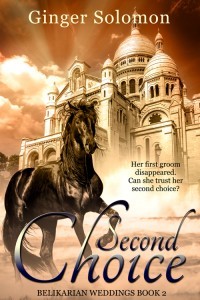 Princess Anaya, the heroine in my latest release, Second Choice, dreads a talk she must have with her father, the king, about her upcoming wedding. Her groom disappeared, leaving a cryptic note behind. Three weeks before the wedding. Her anxiety level is high as she approaches her father’s office. When he hears her news, he is at first outraged, but then he takes a moment and considers the situation. In the end, her father shows her a bit of unexpected affection—something she desperately needed. It wasn’t as bad as she anticipated, and it had an unexpected result. She and her father grew closer.
Princess Anaya, the heroine in my latest release, Second Choice, dreads a talk she must have with her father, the king, about her upcoming wedding. Her groom disappeared, leaving a cryptic note behind. Three weeks before the wedding. Her anxiety level is high as she approaches her father’s office. When he hears her news, he is at first outraged, but then he takes a moment and considers the situation. In the end, her father shows her a bit of unexpected affection—something she desperately needed. It wasn’t as bad as she anticipated, and it had an unexpected result. She and her father grew closer.
What about you? Have you ever anticipated an event to only be disappointed? Or dreaded an event only to realize your imagination had made it worse than it actually turned out to be?
Her website is at: www.gingersolomon.com
Find her on FaceBook at: www.facebook.com/writerGingerSolomon
Her Twitter handle is @gingerS219
BUY LINK: http://amzn.to/26xXfYX
JIM: We’d love for you to leave a comment about any experience you had that just didn’t work out (good or bad) the way you expected.
April 29, 2016
The Storm
The storm roared in at 1:02 in the morning. Rain, hail, wind, lightning.  Enough to wake a person from a deep sleep. In the end, we received nearly an inch of rain, but no real damage. That is significant because we live in the middle of a forest and such storms often leave with trees on the ground, and quite possibly no electricity in our house.
Enough to wake a person from a deep sleep. In the end, we received nearly an inch of rain, but no real damage. That is significant because we live in the middle of a forest and such storms often leave with trees on the ground, and quite possibly no electricity in our house.
But what is significant about this particular storm and its arrival at 1:02 in the morning is that Mark Scirto, meteorologist from KLTV, had predicted that the storm would reach our area about 1:00 a.m.. And, he had made that forecast 31 hours before the storm actually hit. Impressive. I ignored the two minute discrepancy.
As I thought about this the next day, I remembered a student I had many decades ago when I was teaching a computer science course at the University of Oklahoma. He was an Army officer sent back to school for additional training. Each student in my class had to undertake a major project. His interest in weather forecasting led to his project: produce maps of isobars. This would be a map with lines connecting points having the same atmospheric pressure.
That far back in computer history, instructing the computer to draw a map was difficult. There were no packages to facilitate such a task. The student had to write the code to position and guide the plotter.
The army officer worked hard and produced a commendable project.  But he could only get data that was many days old, much of it a week old. To gather data from more than one weather station was not straight forward.
But he could only get data that was many days old, much of it a week old. To gather data from more than one weather station was not straight forward.
Today, we have an app on our smart phone and can get such a map accurate within the last five minutes. Of course, we can get many other types of weather information, showing the conditions over the last hour or five minutes ago. And we are not limited to our local area. If we want to know about the weather where one of our children is living, be it Pennsylvania, or Kansas, or California, we can get it. Quickly. As fast as we can type.
Of course, we are very interested in the weather this time of the year when thunderstorms and tornados are born, raised, and wandering around. But as an author, it reminded me of the rapid change in the publishing industry. Amazon, Print on Demand, and digital book readers have changed the atmosphere for authors and readers.
Amazon was created on July 5, 1994. It’s difficult to know exactly when POD first became commercially available, but not very far back.
Living in the woods of east Texas, I find it important to keep track of the weather. Ignoring it could be disastrous. Disregarding the rapid changes in the publishing industry could be dangerous to an author.
James R. Callan
If you would like to receive my occasional e-mail, click here to sign up, and I’ll send you either a free book or a short story, your choice.
I promise not to sell or give your e-mail address away. And I won’t spam you either, just fun and free stuff. 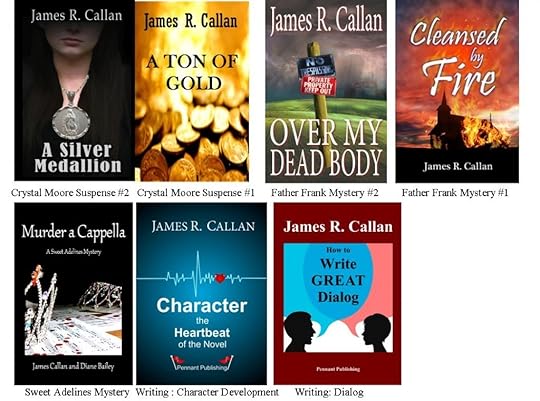
April 22, 2016
WHAT EVERY STORY NEEDS —
Today, we have a double treat. First, Ann Everett is blogging here and  she has such an engaging style. You will love it. And second, she is giving away a ten-dollar (that’s $10) Amazon gift card to someone who leaves a comment (selected at random, of course). Ann is an award-winning and Amazon Best-Selling author who thinks Texans are some of the funniest people on earth. When speaking at conferences and to writing groups, businesses, and book clubs, she incorporates her special brand of wit. And I’ll give you ten things you won’t know about Ann by reading her bio. But first, here’s her take on what every story needs.
she has such an engaging style. You will love it. And second, she is giving away a ten-dollar (that’s $10) Amazon gift card to someone who leaves a comment (selected at random, of course). Ann is an award-winning and Amazon Best-Selling author who thinks Texans are some of the funniest people on earth. When speaking at conferences and to writing groups, businesses, and book clubs, she incorporates her special brand of wit. And I’ll give you ten things you won’t know about Ann by reading her bio. But first, here’s her take on what every story needs.
EVERY STORY NEEDS A BORDERLINE FOOL
Back in the 80’s, country music singer, K. T. Oslin burst onto the scene with her Grammy winning song, 80’s Ladies, which began:
 We were three little girls from school One was pretty, one was smart and one was a borderline fool.
We were three little girls from school One was pretty, one was smart and one was a borderline fool.
I loved that song and thought how the description described my two school besties and myself. Mahlon (pronounced Maylon) was pretty, Kathy was smart, and I was the borderline fool.
One of the questions I get most from readers is which character am I in my stories? My answer: all of them! Most of my books revolve around three female friends…and usually, one will be smart, one will be pretty, and one will be quirky. Apparently, those 80’s Ladies lyrics stuck with me!
I spend a lot of time deciding how I want to portray the borderline fool, because although she is not generally the main character, experience tells me she will steal a lot of the scenes.
In my Tizzy/Ridge Trilogy, Rayann is afraid of…skunks, clowns, gnomes, mimes, etc. Synola has an odd vocation. She writes hangtags for Luscious Leg Jeans. She also has a sharp tongue with snarky comebacks for everything.
In the final book of that series, the local Texas Ranger has a list of fifteen female suspects. Making them all standout in their own way kept me up at night. Among them, is a horse trainer, auctioneer, artist, Hummel collector, and evangelist. As if that wasn’t enough, I threw in a talking bird!
In Tell Me a Secret, Maggie (she is the main character) collected rocks as a child and journaled about them.
In Two Wrongs Make Right, Tarot reader, Raynebeaux Starr has a strange fashion style. She was such a fan favorite, her own story, Say You’ll Never Love Me released on April 1.
I enjoy writing weird characters. Anything that will make them stand out…and guess what? If they are secondary actors and fans connect with them, you can write a companion book to their first appearance as I did with Raynebeaux. Which is a super marketing tool. Connect books and you’ll sell more!!
My point to all this…even in serious, dark, tragedies, a little comic relief or oddity isn’t a bad thing. Readers like peculiar players. Plus, who wants to read something where all the personalities are the same?
Now, don’t get me wrong. Fiction is a beautiful thing and I can make my borderline fool also smart and pretty…and I do! I try not to make her perfect since none of us are and as readers, we want to identify with the character. But hey, if she’s based on me, myself and I, it’s only fair I take liberties.
Do you use weird characters in your work? If so, is it a conscious decision, or does the story just take you there? I love learning other techniques. Comment and let me know how you develop your characters.
JIM: Please leave a comment and I’ll enter you in the drawing for the $10 Amazon Gift Card. And I did not forget. Those ten things are down below her contacts. Take a look.
Learn more about Ann and her books @ http://www.anneverett.com
Latest release: Say You’ll Never Love Me
http://www.amazon.com/Say-Youll-Never-Love-Me-ebook/dp/B01BT4A8GQ/
Follow Ann:
Facebook https://www.facebook.com/LOACL/?ref=h l
Twitter http://www.twitter.com/TalkinTwang
Pinterest http://www.pinterest.com/loacl/
Amazon author page http://www.amazon.com/author/ann.everett
Goodreads profile https://www.goodreads.com/author/show/5195211.Ann_Everett
Ten things you won’t know about Ann by reading her bio:
She’s been married to the same man since dirt.
She loves shopping at thrift stores.
She doesn’t remember her first kiss.
She hates talking on the telephone.
A really sharp pencil makes her happy.
She secretly wants to get a tattoo.
A charter member of National Honor Society in high school remains one of her proudest moments.
She’s thankful wrinkles aren’t painful.
She sucks at math.
Remember to leave a comment. And thanks.
April 15, 2016
THE SECRET TO WRITING A STORY PEOPLE WILL READ
Our guest today is Rabbi Ilene Schneider, one of the first six rabbis ordained in the U.S.. She has retired and taken up writing full time She has won too many awards to list here. Suffice it to say, she knows about writing stories people will read. She lives, and writes, in New Jersey. Listen to a woman who knows what she is talking about.
ordained in the U.S.. She has retired and taken up writing full time She has won too many awards to list here. Suffice it to say, she knows about writing stories people will read. She lives, and writes, in New Jersey. Listen to a woman who knows what she is talking about.
THE SECRET TO WRITING A STORY PEOPLE WILL READ
A short while ago, a friend, who is a fan of mysteries, asked me if I had ever read any books by a specific author. The author has won numerous awards and is the name you do not want to see on a “best of year” ballot with yours. You may as well take her out for a celebratory drink before the voting ends. Yet, despite her status as a “must read,” and even though I have heard her speak at conferences, I had never read her series. I told my friend I’d download the first book in the series to my Kindle and try it.
That was two weeks ago. I am now on the fifth book in the series. I finish one and immediately click the link to download the next. There is no more than a minute lag between my reading.
My only explanation for why I had not read the books earlier is they are described as police procedurals. I do enjoy some, but have also found too many that seemed as though I would like them, until they devolved into “torture porn.” I am a fan of the problem-solving part of police procedurals, but not of detailed descriptions of every indignity, injury, and horror visited upon the victims. I have become cautious about reading books categorized as police procedurals unless recommended by friends with tastes similar to mine.
This books in this latest series I’m reading are more like cozies, although the protagonist is not an amateur but a homicide detective. The author has incorporated several other aspects of cozies, though: humor, much back story, digressions, continuing characters who change and develop, just enough misdirection to be interesting without too much obfuscation, a satisfactory ending in which justice is done.
During the third book, however, there was an error of fact. Errors, whether they are from sloppy copy editing or lack of research, are a pet peeve. I once stopped reading a critically acclaimed Jewish-themed novel that misidentified a Jewish holiday. I guess the critics who praised the book weren’t Jewish.
I got to the error in this book. Stopped. Swiped my finger to the left to the previous page. Reread the event that bothered me. Stopped. Stared into space. Read again. It hadn’t changed.
True, it was something that is “common knowledge,” but a misconception. Or misinformation. Or just untrue. One of the characters found a nest full of duck eggs on the ground. Anoher character said to leave them alone, “Their mother will reject them if you  touch.” Later, someone did touch them and yet another character said, “Then the birds came back and wouldn’t sit on the nest … Just as you predicted.”
touch.” Later, someone did touch them and yet another character said, “Then the birds came back and wouldn’t sit on the nest … Just as you predicted.”
Sorry. Untrue. Birds, with a few exceptions such as Turkey Vultures that rely on their sense of smell to find carrion, have a poorly developed olfactory nerve. They rely on sight to find food. If you find a nest that fell onto the ground with eggs or hatchlings, replace it in the tree or put it under a bush where it will be safe from predators. The parents will find the nest. In fact, they’re probably observing you.
Had it been a book by any other author, I likely would have deleted it from my Kindle without finishing it. But I continued to read, hoping that a character would correct the mistake. No one did, but not only did I finish Book #3, but I will continue to read the series.
To explain why, I need to refer to Game of Thrones, both the TV series and the books. The elements in the story – graphic blood and gore, torture, explicit sex, zombies, ghosts, magic, dragons – are ones I do not enjoy, will not read or view 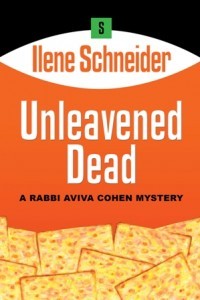 on a big, little, or tiny screen.
on a big, little, or tiny screen.
So why did I binge watch the first season and why have I read all the books? For the same reason I continued reading the cozy police procedural and will continue until the series ends.
Both authors are fantastic story tellers.
And that is the secret to writing a story people will read.
JIM: Please visit her website/blog at:
http://rabbiauthor.com
or email her at
rabbi.author@yahoo.com.
And throw in a comment of your thoughts on how to convince the reader to … read your stories.
April 8, 2016
Finding Splendor in the Ordinary
Today’s guest is award-winning author Jim H. Ainsworth. A former CPA, CLU and stockbroker, he was twice named one of the most influential accountants in America. He has authored four business books and seven novels. He was also a team roper and once led a covered wagon and horseback trip across Texas. There’s a lot more to know about Jim, but let’s get to his blog.
CPA, CLU and stockbroker, he was twice named one of the most influential accountants in America. He has authored four business books and seven novels. He was also a team roper and once led a covered wagon and horseback trip across Texas. There’s a lot more to know about Jim, but let’s get to his blog.
Almost all the writers I read about say they knew they were going to write along about Kindergarten time. Not me. I didn’t write seriously until deep into middle age. And when I began, I didn’t really think of myself as a writer. Writers were weird.
Parents with the best of intentions tell their kids they can be whatever they want to be. My daddy used to say, “Son, there’s no such word as can’t.” I owe him a debt of gratitude for that. But the truth is, we sometimes really can’t become what we most want to be. I could not be a pro athlete like I dreamed. Just didn’t have the body or the skills, not matter how long I practiced.
But we can make the best use of the talents and physical skills God gave us.
I once had a unique opportunity to get to know a well-known motivational speaker and author. In a rare one-on-one conversation, I found the courage to make an admission. “After reading books, attending seminars, and listening to motivational tapes for years, I have come to the conclusion that this feel-good rhetoric just does not work for me.” He asked why and I answered, “I’m just an average guy with realistic expectations for myself. The rah-rah stuff is just not me.”
He answered, “But don’t you see? Being ordinary is a gift. You know what ordinary people want, need, understand and enjoy because you are one of them. You can communicate with ordinary people by the written and spoken word because your language is their language.”
Still, who wants to be called ordinary or mediocre? But it did get me to thinking. Twenty years before my first book, I began keeping a journal, then making notes about ideas and recollections that came to mind. Writing them down brought a veritable onslaught of memories from the deep recesses of my mind. And I somehow knew that those memories must not be dropped back into the grave of forgotten moments in time.
In a recent issue of Writer’s Digest magazine, acclaimed author Brad Meltzer says his core belief is that ordinary people change the world.
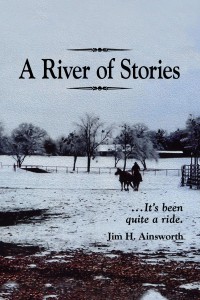 A book you write may not change the world, but it’s almost guaranteed to change you. By writing, you can relate your own misgivings, doubts, and how achieving a purpose is a lifelong journey that may not happen in the order we want it to. In my book, A River of Stories, I quote Frederick Buechner, . . . “a book you write, like a dream you dream, can have more healing and truth and wisdom in it (at least for yourself) than you feel in any way responsible for.”
A book you write may not change the world, but it’s almost guaranteed to change you. By writing, you can relate your own misgivings, doubts, and how achieving a purpose is a lifelong journey that may not happen in the order we want it to. In my book, A River of Stories, I quote Frederick Buechner, . . . “a book you write, like a dream you dream, can have more healing and truth and wisdom in it (at least for yourself) than you feel in any way responsible for.”
Ordinary people can be writers. In fact, well-adjusted people should write more books. I think there should be more memoirs about good parents and handling the blessings as well as the tragedies of life.
Boring you say? Nonsense. What’s more interesting than to reach into the lives of ordinary people placed in extraordinary situations? Brad Meltzer, in that same article, said, “I have no interest in the great person, I have interest in the regular person who finds that great moment within himself.”
Anton Chekhov said, “Any idiot can face a crisis—it is this day-to-day living that wears you out.” I don’t know about the first part, but the last part is definitely true. And that’s why stories of ordinary people living their day-to-day lives can be filled with splendor.
So how do we find that splendor in the ordinary? First, we have to recognize, no matter how hard it is, no matter how skeptical we are, that all our lives are filled with splendor—and that splendor often comes from adversity. Writers find a way to bring that splendor out of the depths of our subconscious and put it on paper. Ravi Zacharias in his book The Grand Weaver, said, “… how easily we take for granted the gift of being normal. Sometimes those of us who have been blessed the most seem to be the least grateful of seeing God’s gracious hand on us.”
So what form will your splendor take—a memoir, an autobiography, a biography, a children’s book, or a novel? And who will want to read something that comes from an unknown writer?
Answer: The form it takes should not be your primary concern. Just start organizing your notes and writing a few scenes. The form will come to you.
Add your comments on the Splendor in the Ordinary.
Jim’s website is: www.jimainsworth.com
And he would love to hear from you, at: jim@jimainsworth.com



